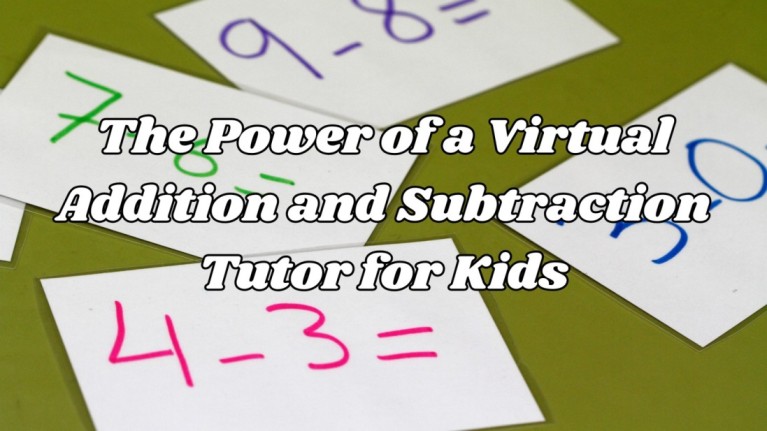Making Math Fun and Accessible: The Power of a Virtual Addition and Subtraction Tutor for Kids
As technology reshapes our world, education is experiencing its own transformation—especially in the area of foundational learning like addition and subtraction. For many young learners, mastering these basic math skills can be a challenge, and traditional classroom settings don’t always offer the one-on-one support necessary for every child to thrive. Enter the virtual math tutor, a solution that combines personalized learning with interactive digital tools to make math fun, accessible, and effective for kids.
In this blog, we’ll dive into the unique benefits of virtual tutoring for addition and subtraction, why these basic skills are critical, and how a supportive digital learning environment can make all the difference in building a strong math foundation.
The Importance of Addition and Subtraction in Early Learning
Addition and subtraction are much more than mere arithmetic exercises. They lay the groundwork for a child’s future math education, developing the skills they’ll use in every aspect of mathematics and beyond. These early math concepts also teach kids how to approach problems, think logically, and practice patience—qualities essential for academic and personal success.
Struggling with addition and subtraction can cause young learners to fall behind, creating gaps in knowledge that can snowball over time. If a child feels frustrated or left out in class, they may develop math anxiety, a psychological barrier that can impact confidence in math for years to come. This is where a virtual math tutor can become a game-changer by offering support, encouragement, and strategies that help children tackle math in a comfortable, accessible way.
How a Virtual Addition and Subtraction Tutor Helps Your Child Thrive
1. Personalized, Flexible Learning
One of the biggest advantages of virtual tutoring is that it’s customizable. Every child learns differently, and virtual tutors can adapt their teaching styles to meet each child’s needs. This flexibility ensures that young learners can progress at their own pace, taking the time they need to grasp each concept before moving on. With a virtual tutor, your child has the freedom to learn without the pressure of keeping up with a classroom, giving them the chance to truly understand addition and subtraction.
Additionally, virtual sessions can be scheduled to fit around your family’s routine, making learning convenient and accessible. Whether your child learns best in the morning, after school, or on weekends, a virtual tutor can accommodate, making the learning process as comfortable and stress-free as possible.
2. Engaging, Interactive Learning Tools
The power of digital learning goes beyond convenience—it also allows for engaging, interactive experiences that traditional settings can’t always offer. Many virtual tutors use digital tools like interactive whiteboards, math games, animations, and visual aids to keep children engaged. These resources bring math to life, turning addition and subtraction exercises into exciting challenges.
For example, instead of just memorizing sums, a virtual tutor might use a digital game where children have to add or subtract numbers to “win” and reach the next level. This not only makes math more enjoyable but also helps kids retain information by associating learning with fun experiences.
3. Real-Time Feedback and Adaptive Learning
A virtual tutor offers immediate feedback, which is crucial for young learners. Real-time responses mean children can correct mistakes on the spot, helping them understand where they went wrong and learn the correct approach. This feedback loop accelerates learning by reinforcing correct methods and guiding them away from errors.
With adaptive learning techniques, many virtual tutoring platforms can adjust the difficulty of math problems based on your child’s performance. If they’re struggling, the tutor or program can provide simpler problems to build confidence. If they’re excelling, they can receive more challenging problems to keep them engaged. This adaptive approach creates a customized experience that fosters a child’s growth in a progressive, manageable way.
4. Confidence Building and Anxiety Reduction
Math anxiety can be a significant obstacle for many children, and it can start as early as elementary school. A virtual math tutor provides a safe, judgment-free space for kids to explore math, ask questions, and make mistakes without fear of embarrassment. This supportive environment is essential for building confidence, which is half the battle when it comes to learning math.
In time, students who work with a virtual tutor often start to see math as a series of solvable puzzles, rather than an intimidating subject. By breaking down problems into achievable steps, virtual tutors help children view math as something they can conquer with practice and patience, empowering them to tackle more complex problems down the line.
5. Building a Strong Foundation for Lifelong Learning
Beyond addition and subtraction, a virtual math tutor helps instill a growth mindset in young learners—a belief that intelligence and skills can improve with effort and perseverance. By mastering the basics, kids develop critical thinking, problem-solving, and analytical skills they’ll use throughout their education and beyond.
A good tutor not only teaches math but also encourages curiosity and resilience. For example, if a child struggles with a particular addition or subtraction problem, the tutor might guide them through it using creative problem-solving techniques. These strategies will stick with children, equipping them with tools to approach future learning challenges confidently.
Choosing the Right Virtual Addition and Subtraction Tutor for Your Child
When selecting a virtual tutor, look for someone who not only understands math but also has experience working with young children. The ideal tutor is patient, encouraging, and able to make math relatable to your child’s everyday life. Here are some tips for finding the right tutor:
- Experience in Early Math Education: Tutors with backgrounds in teaching young children understand the nuances of early education and have methods to make learning fun and effective.
- Engaging Teaching Style: A tutor who uses digital tools and interactive elements can turn math into an exciting experience for your child.
- Patience and Approachability: Kids need a tutor who is approachable and patient, willing to explain concepts multiple times in different ways to ensure understanding.
You may also want to consider a tutor who specializes in gamified learning or uses platforms that offer progress tracking. Some virtual tutoring services offer detailed feedback, letting you know which areas your child has mastered and which need more work, so you can stay informed about their learning journey.
The Lasting Impact of Virtual Math Tutoring
Virtual tutoring has become a powerful educational tool, particularly for younger students learning fundamental skills like addition and subtraction. It’s not just about improving math scores; it’s about fostering a lifelong love for learning and building the confidence to tackle academic challenges. With a virtual tutor, children can take control of their learning journey, equipped with personalized support and engaging tools that make math approachable and fun.
By investing in a virtual addition and subtraction tutor, you’re giving your child more than just math skills—you’re helping them build resilience, self-belief, and a growth mindset that will serve them in every aspect of life. And as they become confident young learners, you’ll see that the benefits of a virtual math tutor go far beyond numbers, impacting their entire approach to education and life.





